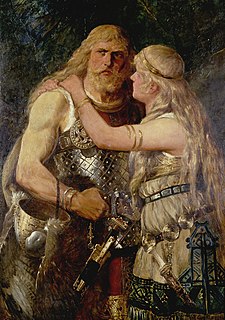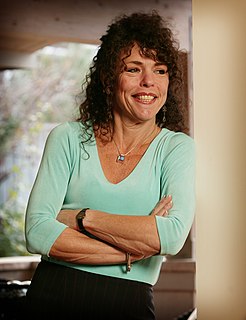Related Research Articles

From the earliest days of the Christian faith, Christians have honored holy matrimony as a divinely blessed, lifelong, monogamous union, between a man and a woman. According to the Episcopal Book of Common Prayer (1979), reflecting the traditional view, "Christian marriage is a solemn and public covenant between a man and a woman in the presence of God," "intended by God for their mutual joy; for the help and comfort given one another in prosperity and adversity; and, when it is God's will, for the procreation of children and their nurture." However, while many Christians might agree with the traditional definition, the terminology and theological views of marriage have varied through time in different countries, and among Christian denominations.

Marriage, also called matrimony or wedlock, is a culturally and often legally recognized union between people called spouses. It establishes rights and obligations between them, as well as between them and their children, and between them and their in-laws. It is considered a cultural universal, but the definition of marriage varies between cultures and religions, and over time. Typically, it is an institution in which interpersonal relationships, usually sexual, are acknowledged or sanctioned. In some cultures, marriage is recommended or considered to be compulsory before pursuing any sexual activity. A marriage ceremony is called a wedding.

Pamela Denise Anderson is a Canadian-American actress and model. She is best known for her glamour modeling work in Playboy magazine and for her appearances on the television series Baywatch (1992–1997).

An engagement or betrothal is the period of time between a marriage proposal and the marriage itself. During this period, a couple is said to be fiancés, betrothed,intended, affianced, engaged to be married, or simply engaged. Future brides and grooms may be called fiancée (feminine) or fiancé (masculine), the betrothed, a wife-to-be or husband-to-be, respectively. The duration of the courtship varies vastly, and is largely dependent on cultural norms or upon the agreement of the parties involved.

The Mitford family is an aristocratic English family, whose principal line had its seats at Mitford, Northumberland. Several heads of the family served as High Sheriff of Northumberland. A junior line, with seats at Newton Park, Northumberland, and Exbury House, Hampshire, descends via the historian William Mitford (1744–1827) and were twice elevated to the British peerage, in 1802 and 1902, under the title Baron Redesdale.

Diana, Lady Mosley was one of the Mitford sisters. In 1929 she married Bryan Walter Guinness, heir to the barony of Moyne, with whom she was part of the Bright Young Things social group of Bohemian young aristocrats and socialites in 1920s London. Her marriage ended in divorce as she was pursuing a relationship with Oswald Mosley, leader of the British Union of Fascists. In 1936, she married Mosley at the home of the propaganda minister for Nazi Germany, Joseph Goebbels, with Adolf Hitler as guest of honour.

A wife is a female in a marital relationship. A woman who has separated from her partner continues to be a wife until the marriage is legally dissolved with a divorce judgement. On the death of her partner, a wife is referred to as a widow. The rights and obligations of a wife in relation to her partner and her status in the community and in law vary between cultures and have varied over time.

Marriage in the Catholic Church, also known as holy matrimony, is the "covenant by which a man and woman establish between themselves a partnership of the whole of life and which is ordered by its nature to the good of the spouses and the procreation and education of offspring", and which "has been raised by Christ the Lord to the dignity of a sacrament between the baptised." Catholic matrimonial law, based on Roman law regarding its focus on marriage as a free mutual agreement or contract, became the basis for the marriage law of all European countries, at least up to the Reformation.
Casti connubii is a papal encyclical promulgated by Pope Pius XI on 31 December 1930 in response to the Lambeth Conference of the Anglican Communion. It stressed the sanctity of marriage, prohibited Catholics from using any form of artificial birth control, and reaffirmed the prohibition on abortion. It also explained the authority of church doctrine on moral matters, and advocated that civil governments follow the lead of the church in this area.
In legal definitions for interpersonal status, a single person refers to a person who is not in committed relationships, or is not part of a civil union. In common usage, the term 'single' is often used to refer to someone who is not involved in any type of romantic relationship, including long-term dating, engagement, marriage, or someone who is 'single by choice'. Single people may participate in dating and other activities to find a long-term partner or spouse.
A Hollywood marriage originally meant a glamorous high society marriage between celebrities involved in the U.S. film industry, as "Hollywood" is a common metonymous term for that industry; such marriages are more commonly known as supercouples in modern parlance. However, the term has grown to also have strong negative connotations of a marriage that is of short duration and quickly ends in separation or divorce. The term developed the negative connotations fairly early; by the 1930s, a "Hollywood marriage" was a marriage both glamorous and short-lived.
Gigi Levangie is an American novelist, screenwriter, and television producer. She has written numerous screenplays but is most widely known for the film Stepmom, starring Julia Roberts and Susan Sarandon. Levangie Grazer is also the author of a number of New York Times best-selling novels including The Starter Wife, Maneater, Queen Takes King, and The After Wife.
Marianne Wiggins is an American author. According to The Cambridge Guide to Women's Writing in English, Wiggins writes with "a bold intelligence and an ear for hidden comedy." She has won a Whiting Award, an National Endowment for the Arts award and the Janet Heidinger Kafka Prize. She was a finalist for the Pulitzer Prize in fiction in 2004 for her novel Evidence of Things Unseen.
Take Another Little Piece of My Heart: A Groupie Grows Up is a non-fiction 1993 work by former groupie Pamela Des Barres. Continuing where I'm with the Band: Confessions of a Groupie left off, this book chronicles her life after being a groupie including the ups and downs of her turbulent marriage to actor/singer Michael Des Barres. Much of the book is about the couple's divorce in 1991 and the effects of the family dysfunction on their son, Nicholas Dean Des Barres.
Dating is a stage of romantic relationships in which two individuals engage in activity together, most often with the intention of evaluating each other's suitability as a partner in a future intimate relationship. It falls into the category of courtship, consisting of social events carried out by the couple either alone or with others. The protocols and practices of dating and the terms used to describe it vary vastly between cultures, societies, and time periods. Although dating is most often colloquially used to refer to the action of individuals engaging in dates with one other, dating can also encompass a wide range of activities which fall outside participation in dates.

Pamela Paul is an American columnist, journalist, editor, and author. Since 2022, she has been an op-ed writer for The New York Times. From 2013 to 2022, she was the editor of The New York Times Book Review, where her role eventually expanded to oversee all New York Times book coverage including the staff critics and publishing news.
Cohabitation in the United States is loosely defined as two or more people, in an intimate relationship, who live together and share a common domestic life but are neither joined by marriage nor a civil union.

Marriage in China has undergone change during the country's reform and opening period, especially as a result of new legal policies such as the New Marriage Law of 1950 and the Family planning policy in place from 1979 to 2015. The major transformation in the twentieth century is characterized by the change from traditional structures for Chinese marriage, such as the arranged marriage, to one where the freedom to choose one’s partner is generally respected. However, both parental and cultural pressures are still placed on many individuals, especially women, to choose socially and economically advantageous marriage partners. While divorce remains rare in China, the 1.96 million couples applying for divorce in 2010 represented a rate 14% higher than the year before and doubled from ten years ago. Despite this rising divorce rate, marriage is still thought of as a natural part of the life course and as a responsibility of good citizenship in China.

Michele Weiner-Davis is a licensed clinical social worker, marriage and family therapist and author in the field of family therapy. She is frequently quoted in the media and has been interviewed on television news programs regarding divorce prevention. Weiner-Davis has often been referred to as The Divorce Buster after coining the term “divorce busting” at an American Association for Marriage and Family Therapy conference in 1989. She currently writes a regular column, Divorce Busting: Musings From an Unabashed Marriage Saver in Psychology Today.
Grey divorce or silver splitter, is a term referring to the demographic trend of an increasing divorce rate for older ("grey-haired") couples in long-lasting marriages. Former American vice-presidential couple Tipper and Al Gore's decision to separate after over 40 years of marriage is an example of this trend as is the former married research and writing duo Masters and Johnson and music duo Captain and Tennille, whose own divorce came in 2014 after 39 years of marriage. Another example of this is the divorce of the world's 4th richest man, Bill Gates and his wife of 27 years, Melinda French Gates as of May 2021.
References
- ↑ "'Starter Marriages': So Early, So Brief," Deborah Schupack, The New York Times , July 7, 1994.
- ↑ "Starter marriage: A new term for early divorce", USA Today , January 29, 2002.
- 1 2 3 Merkin, Daphne (April 14, 2002). "Can This Divorce Be Saved?". The New Yorker . Archived from the original on December 4, 2021. Retrieved November 4, 2021.
{{cite magazine}}: CS1 maint: bot: original URL status unknown (link) - ↑ "Q: What Do These Women Have in Common? A: They all had starter marriages", Michelle Ingrassia, Daily News (New York), January 24, 2002.